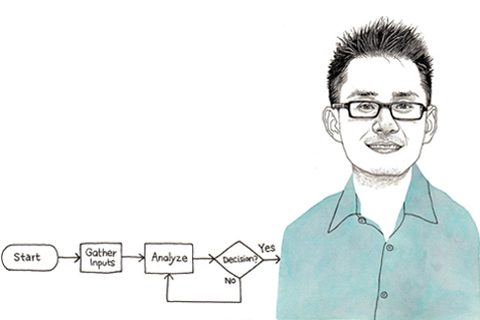Think with your head, and not with your heart, the old adage goes. In the corporate world, this is especially true: decisions are often made through deliberation, careful attention to facts and statistics, and systematic thinking – while emotions are seen as biasing.
However, Chen-Bo Zhong, a professor of organizational behaviour and human-resource management at the Rotman School of Management, is examining the role of intuitive decision-making – which he believes can sometimes prevent people from acting unethically. “Morality is both a process of reason and intuition,” says Zhong, who studies ethical decision making and moral psychology. Take fraud, for example: When a person is thinking of misreporting company performances, he may experience self-disgust or guilt – emotions that may prevent him from engaging in these activities. “These intuitive functions of morality really play a role in signalling to ourselves the value of the choices we are going to make. If we feel disgusted at the thought of cheating, what does that say to you?”
Zhong hopes that his work will help people make better ethical decisions, both in business (such as a manager contemplating accepting outside gifts) and in everyday life (such as someone deciding whether to lend money to a friend). He wants people to understand different decision making processes (both rational and intuitive ones) and how intuition can inform moral values and behaviour.
Zhong is now looking at how physiology affects people’s moral decisions. In a recent experiment, Zhong and colleagues provided participants with false feedback of their heart rates.
Those who listened to an average heartbeat were much more likely to cheat in a deception game than those who listened to a fast heartbeat. Why? Because when people think of behaving badly, the heartbeat is a strong signal of stress and helps indicate the nature of the behaviour. (Zhong points to Raskolnikov, the main character in Crime and Punishment, who couldn’t slow his racing heart when he thought about murder.)
In the classroom, Zhong tackles another element of ethics – in business negotiations. He wants students to think not only about financial outcomes, but about the welfare of people who are affected by the decisions, such as the buyer of a product (think of the financially disadvantaged patient who needs an expensive cancer drug). Zhong – who has received several Excellence in Teaching Awards from Rotman – also teaches strategic negotiation, and gives students experience by having them engage in simulated negotiations. They then reflect on their performance. “These are the most enjoyable parts of teaching – to get to know what students think and what their standpoints are,” he says. “The good classes are the ones in which every student wanted to volunteer their voice.”






